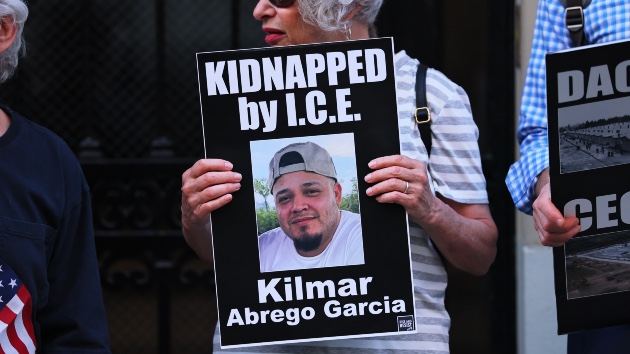(NEW YORK) — Kilmar Abrego Garcia, who is back in the U.S. after being mistakenly deported to his native El Salvador, is set to appear in court in Tennessee on Wednesday for a hearing to address the conditions of his release after a magistrate judge ordered that he should not be detained while he awaits a federal trial on human smuggling charges.
However, he is not expected to go free because U.S. Immigration and Customs Enforcement will likely take him into custody.
On Sunday, U.S. Magistrate Judge Barbara Holmes acknowledged that determining whether Abrego Garcia should be released is “little more than an academic exercise” because ICE will likely detain him due to an immigration detainer the government has on him.
Yet the judge said the government failed to prove there is a “serious risk” that Abrego Garcia will flee or that he will obstruct justice in his criminal case.
Abrego Garcia has been the subject of a prolonged legal battle since he was deported in March to El Salvador’s CECOT mega-prison — despite a 2019 court order barring his deportation to that country due to fear of persecution — after the Trump administration claimed the undocumented immigrant was a member of the criminal gang MS-13, which his family and attorneys deny.
The Trump administration, after arguing for nearly two months that it was unable to bring him back, returned him to the U.S. earlier this month to face charges of allegedly transporting undocumented migrants within the U.S. while he was living in Maryland. He has pleaded not guilty to the charges.
In her 51-page ruling, Judge Holmes raised questions about some of the evidence the government presented during a June 13 hearing — much of which she said consisted of “general statements, all double hearsay from two cooperating witnesses.”
Statements from the two witnesses about Abrego Garcia’s alleged MS-13 membership contradicted each other, Holmes said. One cooperating witness, according to the special agent who testified during the hearing, said that the Salvadoran “may belong to MS-13.” But a second witness, according to the special agent, said that in ten years of acquaintance with Abrego Garcia, there were no signs or markings, including tattoos, indicating that he is a member of MS-13.
“Even without discounting the weight of the testimony of the first and second male cooperators for the multiple layers of hearsay, their testimony and statements defy common sense,” Holmes said.
“The government alleges that Abrego is a longtime, well-known member of MS-13, which the Court would expect to be reflected in a criminal history, perhaps even of the kind of violent crimes and other criminal activity the government describes as typically associated with MS-13 gang membership,” Holmes said. “But Abrego has no reported criminal history of any kind.”
Statements from the cooperating witnesses introduced during the June 13 hearing accused Abrego Garcia of trafficking drugs and firearms and of abusing women and minors that he allegedly transported.
Copyright © 2025, ABC Audio. All rights reserved.

